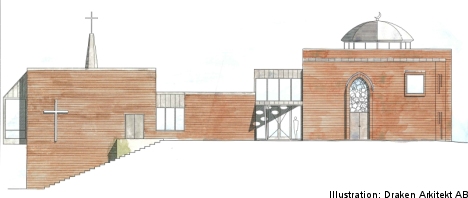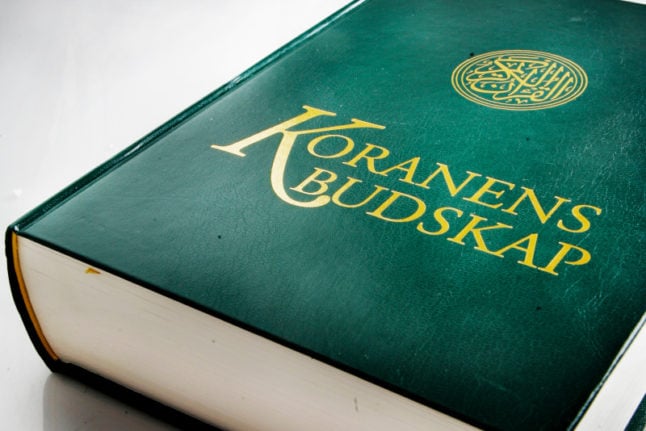On the other side of the Atlantic, an emotional debate rages about the suitability of building a mosque near the Ground Zero site in New York City.
At the same time, the recent political upheaval in North Africa and the Middle East has raised concerns in some quarters that religious fundamentalism may fill the void.
Meanwhile in the parish of Fisksätra, Nacka, a few kilometres south of Stockholm, Muslims, Lutherans and Roman Catholics are joining forces in a unique project attempting to tackle sectarianism by bringing the three groups together under a single roof.
“Religion has been used in such a negative way in history so this is a way of us showing it can be put in a positive light as well,” Imam Awad Olwan of the Muslim Association in Nacka (Muslimska föreningen i Nacka) explains.
According to Henrik Larsson, a pastor with the Church of Sweden in Nacka and project manager for the initiative, the new building would be the only place of worship of its type in the world and the first time that a mosque and a church have been part of the same building since the Umayyad Mosque was built in Damascus in the 600s.
“This is something unique in the world,” he says.
The idea for what has been termed “God’s House” to be built in Fisksätra, near Saltsjöbaden, began to take shape a few years ago as a natural extension of the growing cooperation between the Church of Sweden, St. Konrad’s Catholic Church in Nacka, and the Muslim Association.
“No one really knows how the idea came about, but the three organisations have been working closely together since the 1960s,” Larsson explains.
“In 2004, the local schools came to us and asked us for help and advice in how to teach children about religious tolerance and address any problems, and the idea to do something together started to take form as we thought, ‘Could we do something?'”
The question of religious tolerance in Sweden was brought into sharp relief last autumn after the far-right Sweden Democrats won seats in the Swedish parliament for the first time.
The party campaigned on an openly anti-immigration platform, with advertisements and speeches which singled out Muslim immigrants in particular.
In the wake of the Sweden Democrats’ electoral success, Bishop Bengt Wadensjö of the Church of Sweden wrote an open letter about the Nacka project to the Svenska Dagbladet (SvD) newspaper taking issue with party leader Jimmie Åkesson’s views on immigrations and Muslims.
“We saw that fear of Islam gained a profile with the Sweden Democrats winning parliamentary seats, so I wanted to convey a completely different picture of Sweden,” wrote Wadensjö.
“In Nacka we do not think that Muslims or immigrants should be seen as a threat, as suggested by Jimmie Åkesson. The idea is to demonstrate how people can get along together regardless of culture, language or faith.”
First unveiled in 2009, plans for the project include major renovations to the current building which is owned by the Church of Sweden but which also has space rented by the Catholic Church.
After completion of the first phase of the project, which includes a facelift for Church of Sweden facilities and the expansion of space available for the Catholic Church, a mosque will also be built on land adjacent to the current structure.
The Christian and Muslim houses of worship will then be connected by a communal foyer.
In the longer term it is hoped that together they can also create a youth club and children’s centre together.
The new church will be the culmination of years of hard work put in by leaders from organisations representing Lutherans, Muslims, and Catholics who have sought to build a new place of worship together.
Imam Olwan believes the project is the ideal way to carry on the longstanding cooperation between the three parties.
“It was easy to agree to it, because we have lived and worked side by side for over 20 years,” he explains.
“There are actually not so many differences between our religions, we do after all believe in one God, our children attend the same schools, and we all share similar local issues.”
Not surprisingly, when news began to spread about the church, it received plenty of attention. Larsson says that although he and others involved in the project were expecting a degree of opposition, they have been generally pleased with the response.
“We knew there would be a lot of interest in this and there has been extensive media coverage,” he says
Larsson admits, however that he has received a “fair amount” of negative reaction to the project.
“A lot of it is because, on both sides, we have such a strong picture of each other,” he explains.
“This is at times based on historically bad experiences of each other and much of it could be put down to suspicion these days about Islam. The encouraging thing is that the positive reaction has so far outweighed the negative.”
There is plenty of work still to be done, however, before “God’s House” becomes a reality.
The first stage of the rebuilding work, to be done later this year, will see the shared Catholic and Church of Sweden prayer room completed.
The planning application for the mosque, to be built on land purchased from the Church of Sweden, has been sent to the local authorities and Larsson is hoping for a decision later this year. Therefore it is likely to be at least two more years before the extension is built.
Nevertheless, Olwan of the Muslim Association is optimistic about the power of the project to sway perceptions.
“The idea of Gods House is a big, radical step, but we feel it is a highly symbolic way of showing that we wish to create something together,” he says.
Olwan says he understands that the project won’t necessarily change everyone’s negative attitudes toward other religions, nor does it mean that the groups “have to agree on everything”.
“We just want to bring people together. This is a chance for us to do something of great meaning,” he says.
Presuming the plans are approved, there will another round of financing and planning, which has led to doubts from some that the project will be completed.
And in another symbolic gesture, the Muslim Association is looking to break from tradition by trying to find financing closer to home.
“Generally, when new mosques are built, money tends to come from wealthy donors abroad, but we have decided to try and do it differently and raise money locally instead,” he explains.
“We feel we are all Swedish citizens and we will be looking to work together in this respect as well, seeing it as more proof of how we can all cooperate.”
Larsson says the groups involved with the project remain hopeful that the money necessary can be raised both within Sweden as well as elsewhere in Europe if necessary.
”We believe that the mosque will be ready by 2014,” says Larsson, adding that he hopes the project becomes a model that can be followed elsewhere.



 Please whitelist us to continue reading.
Please whitelist us to continue reading.
Member comments